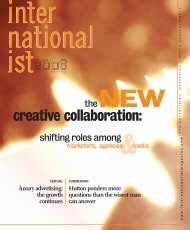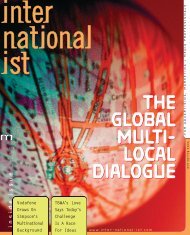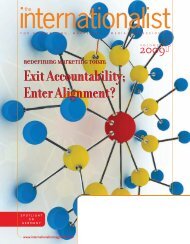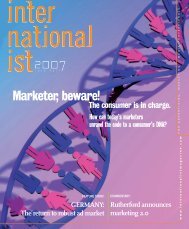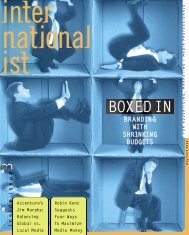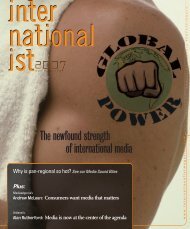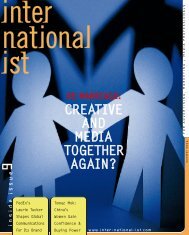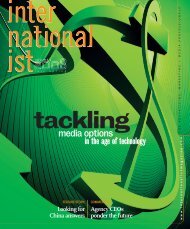2011 Issue 55 - Internationalist
2011 Issue 55 - Internationalist
2011 Issue 55 - Internationalist
You also want an ePaper? Increase the reach of your titles
YUMPU automatically turns print PDFs into web optimized ePapers that Google loves.
F R O N T<br />
TIndra Nooyi<br />
Indra Nooyi, Chairman and Chief Executive<br />
Officer of PepsiCo, oversees some of the<br />
world's largest food and beverage brands that<br />
span over 200 countries and include such<br />
companies as Quaker Oats, Tropicana,<br />
Gatorade, Frito-Lay, and Pepsi-Cola. She is also<br />
the champion of PepsiCo's Performance with<br />
Purpose strategy, designed to deliver<br />
sustainable growth by investing in a healthier<br />
future for people and the planet through<br />
reducing the use of energy, water and<br />
packaging, while providing a better workplace.<br />
Her extraordinary global career is anchored in<br />
both India and the United States. She holds a<br />
BS from Madras Christian College, an MBA<br />
from Calcutta’s Indian Institute of<br />
Management, and a Masters of Public and<br />
Private Management from Yale University. Her<br />
career began in India, where she held product<br />
manager positions at Johnson & Johnson and<br />
at Mettur Beardsell, Ltd., a textile firm. Ms.<br />
Nooyi joined PepsiCo in the U.S. in 1994.<br />
Here are highlights from her<br />
recent keynote address to <strong>2011</strong><br />
AdAsia Advertising Congress held<br />
in Delhi, India and organized by<br />
the Asian Federation of<br />
Advertising Associations (AFAA),<br />
comprised of representatives of<br />
the advertising associations of ten<br />
Asian hcountries<br />
One hundred and fifty years ago now,<br />
Charles Darwin published his classic On<br />
The Origin Of Species.<br />
Darwin’s most brilliant insight, which<br />
has stood the test of time, was that it is not<br />
the strongest that survive but the fittest.<br />
Those who thrived were those who could<br />
adapt to the changing environment.<br />
I became CEO of Pepsico in late<br />
2006. I have to say it is amazing how<br />
rapidly the world has changed since then.<br />
The boom of the first half of the decade<br />
quickly gave way to the troubled times in<br />
the second half. I’ve seen the importance of<br />
devising new rules as you go along.<br />
I certainly don’t have all the answers –<br />
I only wish I did – but I do have five<br />
PepsiCo’s CEO Indra Nooyi Tells<br />
AdAsia that Optimism can Rise<br />
from Uncertainty<br />
thoughts from what I have learned. I hope<br />
they will be useful to you.<br />
The first point is that we all have to<br />
explicitly recognize that we are in a new<br />
reality.<br />
From the top to the bottom of the<br />
company we have to accept that we are in a<br />
new era of uncertainty.<br />
We used to plan from a base of<br />
relative security. Uncertainty was always a<br />
scenario in our planning but we thought of<br />
it as something that upset our plans every<br />
now and then.<br />
Most companies did a one-year<br />
operating plan and a three or five-year<br />
strategic plan. Each assumed a linear<br />
process and, with a few adjustments, you<br />
tended to stick pretty close to the original<br />
plans.<br />
We can’t plan like that any longer.<br />
These days, volatility is not just the way that<br />
our normal lives are disrupted. It is our<br />
normal lives.<br />
Economic progress is uncertain.<br />
Currencies are volatile, many times<br />
decoupled from macroeoconomic behavior.<br />
Commodity prices are unpredictable and<br />
they move quickly.<br />
The old fixed calendars of the<br />
business year have to be rethought. We<br />
have to speed up. We need to start the next<br />
plan while the ink is still drying on the old<br />
one.<br />
We need to be sure that we have<br />
uncertainty built into our plans, from top to<br />
bottom.<br />
We have to think in a wholly different<br />
way. Responding to change is not the same<br />
as being fickle. We need to learn a wholly<br />
new skill.<br />
The skill of adaptability.<br />
The second point is that we have to<br />
lead for today and tomorrow at the same<br />
time.<br />
More than ever before, we are<br />
steering a course through rough seas. We<br />
are tossed on the tide and the journey can<br />
be difficult.<br />
The only way to manage is to fix our<br />
sights on the horizon and steer towards a<br />
distant point in the future.<br />
But, at the same time, we need to<br />
attend to where we are right now.<br />
Uncertain times require us to have a<br />
long term horizon. It is the companies with<br />
a clear long term mission that will thrive.<br />
But at the same time, investors are<br />
understandably more nervous than ever<br />
before. They need great performance, here<br />
and now.<br />
So we have to work on two time scales<br />
at once.<br />
A good return today and a long-term<br />
future; leading for both today and<br />
tomorrow at the same time. Not an easy<br />
task in a volatile environment.<br />
And so I think the companies that<br />
thrive in the new era will be those which<br />
define a compelling vision of the role they<br />
play in society.<br />
A good company is more than just an<br />
engine for the generation of profit. People<br />
want corporations and brands to stand for<br />
something.<br />
At PepsiCo, we have tried to capture<br />
that insight in the phrase “Performance<br />
with Purpose”.<br />
Performance with Purpose is a<br />
marriage of the short term with the long<br />
term.<br />
We don’t make the mistake of<br />
neglecting our investors. It is their capital<br />
that feeds investment for the long-term. It<br />
is their capital that enables us to grow.<br />
But those short-term results must be<br />
sustainable in the long-term.<br />
Speed and agility have become our<br />
best allies. The only way to function is to be<br />
lean and low cost. We need the maximum<br />
efficiency today so that we can deliver great<br />
performance and invest for tomorrow.<br />
That’s the task. To lead for today and<br />
tomorrow at the same time.<br />
My third point is that, in these volatile<br />
times, we need to be ambitious. We must<br />
make big changes to big things.<br />
Great ideas have no borders. We need<br />
to be open to new thinking, from new<br />
places.<br />
The days of incremental thinking are<br />
over. The days when the future was built<br />
on the solid foundations of the past are<br />
gone.<br />
Cost structures are being shaken to<br />
the core by high commodity costs. Top<br />
lines are being threatened by weak<br />
economies. Growth is elusive.<br />
Competition is more severe than ever.<br />
There could be a business model around<br />
the corner that renders ours obsolete.<br />
So, this is not a time for small<br />
changes. We need to make big changes to<br />
big things.<br />
Innovation is not just about<br />
10<br />
T H E<br />
I N T E R N A T I O N A L I S T



